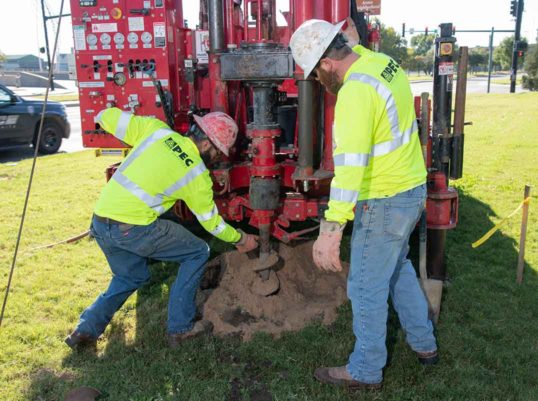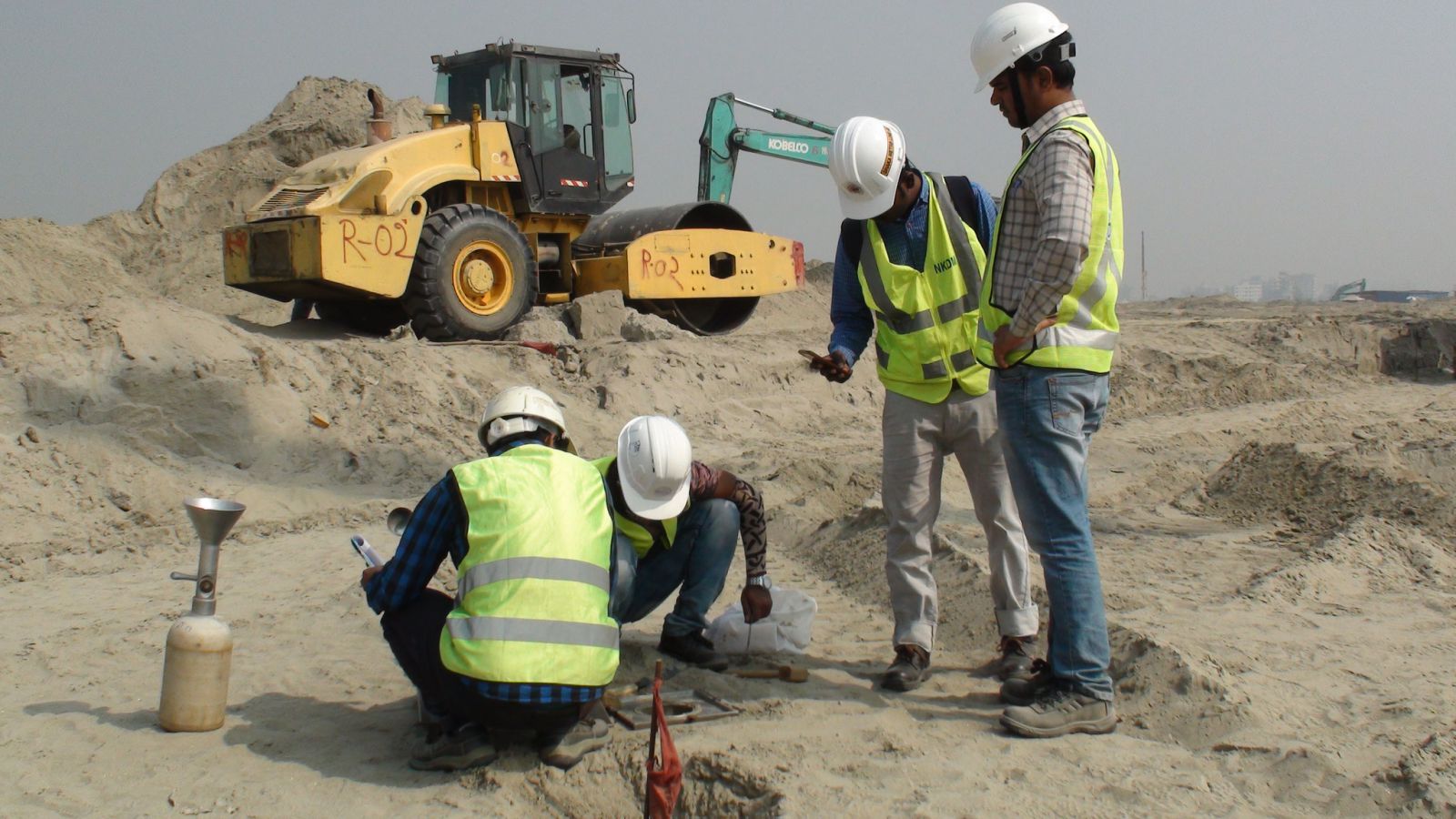Geo Tech Engineer: Enhancing Site Assessments with Advanced Geotechnical Techniques
Geo Tech Engineer: Enhancing Site Assessments with Advanced Geotechnical Techniques
Blog Article
Recognizing the Vital Role of the Geotechnical Industry in Modern Building And Construction Projects and Framework Growth
The geotechnical market is a cornerstone of contemporary construction and facilities growth, supplying essential understandings into dirt habits that directly influence task outcomes. With advanced dirt evaluations and ingenious design remedies, geotechnical specialists not just ensure architectural stability however likewise address sustainability issues amid progressing environmental requirements.
Importance of Dirt Assessment
Soil evaluation plays a vital duty in the geotechnical sector, serving as the structure for educated decision-making in building tasks. Accurate soil analysis is vital for figuring out the suitability of a website for numerous types of frameworks, consisting of residential homes, business structures, and bridges. By analyzing dirt structure, wetness, density, and stamina content, engineers can prepare for potential challenges and mitigate dangers linked with ground instability, erosion, and negotiation.
The evaluation procedure generally entails a collection of tests and monitorings that offer essential information about the subsurface conditions. This data informs the layout and building processes, ensuring that frameworks are improved solid ground with adequate assistance. In addition, recognizing the soil profile makes it possible for engineers to choose appropriate building methods and products, enhancing resource utilization and lessening prices.
In addition to ensuring structural stability, soil evaluation adds to environmental sustainability. By identifying possible contamination or damaging results on bordering communities, engineers can implement methods to secure these natural deposits. In general, comprehensive soil evaluation is indispensable in the geotechnical area, underpinning the safety and security, efficiency, and environmental responsibility of building and construction projects.
Secret Geotechnical Techniques
A variety of key geotechnical techniques are utilized to evaluate and enhance the security and performance of building sites. One fundamental technique is soil sampling and screening, which allows engineers to establish the chemical and physical homes of the ground. This info is important for making notified choices relating to foundation layout and construction methods.
One more vital strategy is site characterization, which involves the in-depth evaluation of soil and rock conditions with methods such as borehole drilling and in-situ testing. Techniques like Requirement Penetration Tests (SPT) and Cone Penetration Tests (CPT) give useful data on soil strength and stratigraphy.
Ground improvement methods, such as soil stablizing and grouting, are additionally vital in improving the load-bearing ability of weak soils. These techniques can mitigate negotiation and improve total website conditions.
Furthermore, slope security evaluation is crucial for determining possible landslide dangers and ensuring the safety and security of excavations. This analysis often employs numerical modeling and restriction balance techniques to predict dirt habits under various conditions.
Incorporating these geotechnical strategies right into building and construction preparation not just optimizes job results however also makes sure the long-term sustainability of facilities growth.
Influence on Building And Construction Security

Furthermore, effective geotechnical design includes executing mitigation methods for recognized threats. This may consist of soil stablizing strategies, preserving structures, or water drainage systems to reduce hydrostatic pressure. By addressing these elements, construction groups can reduce the likelihood of accidents and improve employee safety and security.
Furthermore, constant surveillance of site conditions is crucial during building and construction. Geotechnical instruments can supply real-time data relating to ground motion and stability, enabling for timely interventions when essential.
Basically, the geotechnical industry plays a critical role in guarding building jobs. By focusing on ground stability and using extensive evaluation approaches, the geotechnical market not just protects the workforce however also adds to the durability and dependability of built framework.
Sustainability in Geotechnical Practices

Furthermore, geotechnical engineers are now utilizing innovative modern technologies, such as geosynthetics, which improve dirt stability while minimizing the quantity of material needed. This not just saves sources yet additionally leads to much less waste generation (tailings engineer). The assimilation of lasting style principles into geotechnical engineering motivates the check my site use of sustainable power resources in building and construction processes, even more lowering carbon emissions
By conducting these analyses, geotechnical professionals can develop approaches that minimize adverse impacts, making certain conformity with ecological policies. In general, the focus on sustainability within geotechnical techniques not only adds to the durability and resilience of infrastructure however additionally promotes a responsible approach to land and source administration.
Future Trends in Geotechnical Engineering
Development is driving the future of geotechnical engineering, as emerging modern technologies and approaches improve the sector. The combination of sophisticated information analytics and man-made intelligence is readied to change site investigation and risk assessment, allowing designers to make even more enlightened decisions based on real-time data. Moreover, the use of geosynthetic products is obtaining grip, using lasting services that improve dirt stability and decrease environmental impact.
An additional significant pattern is the adoption of automated and robotic systems for tracking and construction processes. These technologies not only enhance accuracy however also boost safety by decreasing human participation in dangerous environments. Furthermore, the application of Structure Info Modeling (BIM) in geotechnical style promotes improved collaboration amongst stakeholders, optimizing project delivery and decreasing costs.
As environment change presents new challenges, the market is progressively concentrating on durability and versatility in design techniques, guaranteeing infrastructure can withstand extreme weather occasions. The continuous pattern towards sustainability will drive advancement in eco-friendly products and techniques, lining up geotechnical engineering with wider ecological goals. Jointly, these trends will form a much more efficient, lasting, and resilient geotechnical landscape for future projects.
Verdict

The geotechnical industry is a foundation of contemporary construction and infrastructure advancement, supplying essential insights right into dirt habits that directly affect project end results. geo tech engineer.Dirt assessment plays a crucial role in the geotechnical industry, serving as the foundation for informed decision-making in construction projects. In general, Recommended Reading detailed dirt analysis is important in the geotechnical area, underpinning the safety, efficiency, and ecological duty of construction projects
Building safety is dramatically influenced by geotechnical methods, as the security and stability of the ground straight affect the total safety and security of a building website.In verdict, the geotechnical sector is important in modern building and infrastructure development, giving essential evaluations that ensure structural stability and safety and security.
Report this page